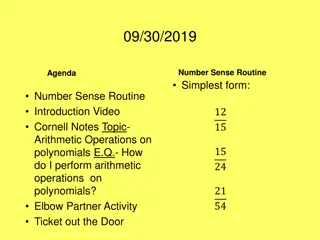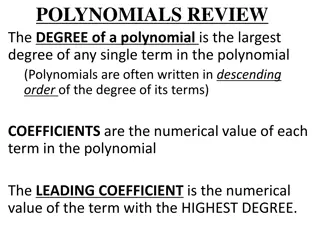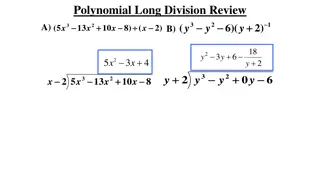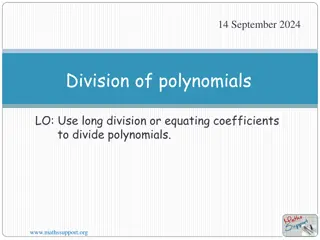Understanding Polynomial Degrees and Special Names
The degree of a polynomial is determined by its highest exponent, with specific names for each degree level. From the basic constant to the nth degree polynomial, this guide showcases the different degrees and their characteristics, helping you grasp the concept of polynomial functions easily.
Download Presentation

Please find below an Image/Link to download the presentation.
The content on the website is provided AS IS for your information and personal use only. It may not be sold, licensed, or shared on other websites without obtaining consent from the author. Download presentation by click this link. If you encounter any issues during the download, it is possible that the publisher has removed the file from their server.
E N D
Presentation Transcript
Degree of a Polynomial The degree of a polynomial is calculated by finding the largest exponent in the polynomial. In order for a function to be polynomial: -leading coefficient must not be zero -exponents must be whole numbers (no negatives -no variables in the denominator **standard form of a polynomial function has the exponents from greatest to least
Degree of a Polynomial (Each degree has a special name ) 9
Degree of a Polynomial (Each degree has a special name ) No variable Constant 9
Degree of a Polynomial (Each degree has a special name ) No variable Constant 9 1st degree Linear 8x
Degree of a Polynomial (Each degree has a special name ) No variable Constant 9 1st degree Linear 8x 2nd degree Quadratic 7x2 + 3x
Degree of a Polynomial (Each degree has a special name ) No variable Constant 9 1st degree Linear 8x 2nd degree Quadratic 7x2 + 3x 6x3 2x 3rd degree Cubic
Degree of a Polynomial (Each degree has a special name ) No variable Constant 9 1st degree Linear 8x 2nd degree Quadratic 7x2 + 3x 6x3 2x 3x4 + 5x 1 3rd degree Cubic 4th degree Quartic
Degree of a Polynomial (Each degree has a special name ) No variable Constant 9 1st degree Linear 8x 2nd degree Quadratic 7x2 + 3x 6x3 2x 3x4 + 5x 1 2x5 + 7x3 3rd degree Cubic 4th degree Quartic 5th degree Quintic
Degree of a Polynomial (Each degree has a special name ) No variable Constant 9 1st degree Linear 8x 2nd degree Quadratic 7x2 + 3x 6x3 2x 3x4 + 5x 1 2x5 + 7x3 5xn 3rd degree Cubic 4th degree Quartic 5th degree Quintic 6th degree or higher nth degree
Lets practice classifying polynomials by degree. POLYNOMIAL 1. 3z4 + 5z3 7 2. 15a + 25 3. 185 4. 2c10 7c6 + 4c3 - 9 5. 2f3 7f2 + 1 6. 15y2 7. 9g4 3g + 5 8. 10r5 7r 9. 16n7 + 6n4 3n2 DEGREE NAME Quartic Linear Constant 4. Tenth degree 5. Cubic 6. Quadratic 7. Quartic 8. Quintic 9. Seventh degree 1. 2. 3. The degree name becomes the first name of the polynomial.
Naming Polynomials (by number of terms) 2 5x
Naming Polynomials (by number of terms) 2 5x One term Monomial
Naming Polynomials (by number of terms) 2 5x x+ One term Monomial 3 Two terms Binomial
Naming Polynomials (by number of terms) 2 5x x+ One term Monomial 3 Two terms Binomial + 3 Three terms Trinomial 7 2 4 x x
Naming Polynomials (by number of terms) 2 5x x+ One term Monomial 3 Two terms Binomial + 3 Three terms Trinomial 7 2 4 x x Four (or more) terms Polynomial with 4 (or more) terms + + 4 3 2 2 2 5 x x x x
Lets practice classifying a polynomial by number of terms . Polynomial 15x 2. 2e8 3e7 + 3e 7 6c + 5 4. 3y7 4y5 + 8y3 5. 64 6. 2p8 4p6 + 9p4 + 3p 1 7. 25h3 15h2 + 18 8. 55c19 + 35 Classify by # of Terms: Monomial 2. Polynomial with 4 terms Binomial 4. Trinomial 5. Monomial 6. Polynomial with 5 terms 7. Trinomial 8. Binomial 1. 1. 3. 3.
Can you name them now? POLYNOMIAL 5x2 2x + 3 2. 2z + 5 3. 7a3 + 4a 12 4. -15 5. 27x8 + 3x5 7x + 4 CLASSIFICATION / NAME Quadratic Trinomial 2. Linear Binomial Cubic Trinomial 4. Constant Monomial 8th Degree Polynomial with 4 terms. 6. Quartic Binomial 7. Linear Binomial 8. Quintic Monomial 1. 1. 3. 5. 6. 9x4 3 7. 10x 185 8. 18x5





























